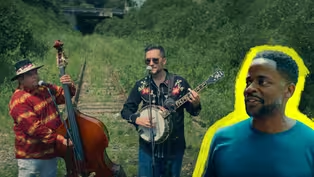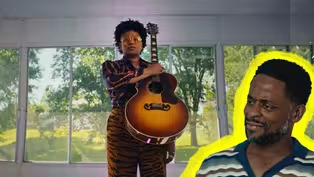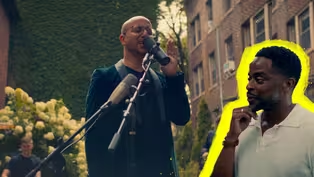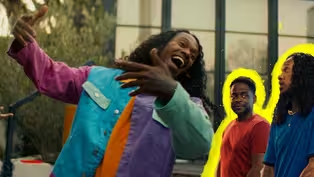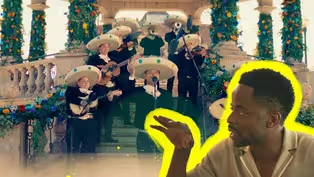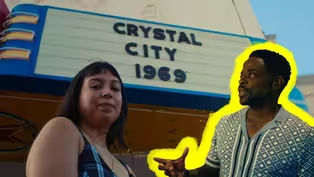
Revitalizing Nightlife in San Francisco’s Chinatown
Special | 10m 3sVideo has Closed Captions
A multi-generational effort to preserve San Francisco Chinatown’s rich cultural history.
San Francisco Chinatown’s golden era saw showgirls, Broadway stars and businessmen nightly, but by the 1970s, the entertainment scene had disappeared. Now, a multigenerational alliance has formed to revive its historical vitality.
Problems playing video? | Closed Captioning Feedback
Problems playing video? | Closed Captioning Feedback
This program was made possible by a grant from Anne Ray Foundation.

Revitalizing Nightlife in San Francisco’s Chinatown
Special | 10m 3sVideo has Closed Captions
San Francisco Chinatown’s golden era saw showgirls, Broadway stars and businessmen nightly, but by the 1970s, the entertainment scene had disappeared. Now, a multigenerational alliance has formed to revive its historical vitality.
Problems playing video? | Closed Captioning Feedback
How to Watch The Express Way with Dulé Hill
The Express Way with Dulé Hill is available to stream on pbs.org and the free PBS App, available on iPhone, Apple TV, Android TV, Android smartphones, Amazon Fire TV, Amazon Fire Tablet, Roku, Samsung Smart TV, and Vizio.
Buy Now
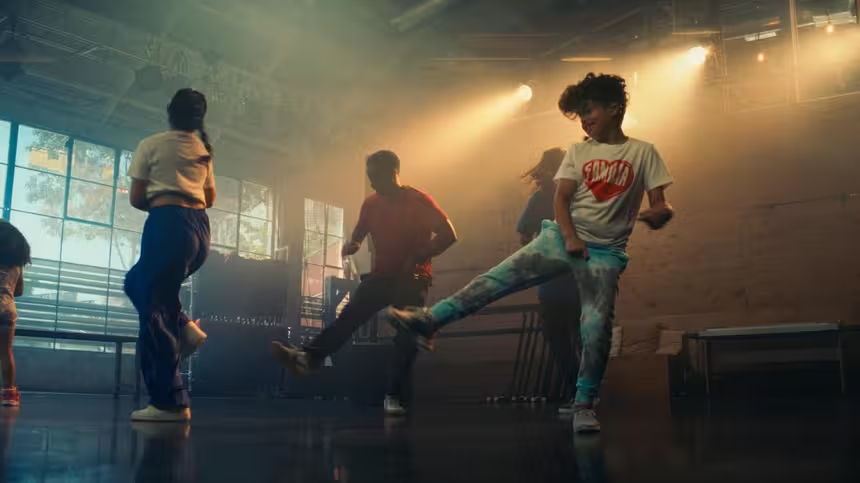
5 Artists Showcasing the Power of Art
From colorful cabarets and moving movies to artistic techniques that transcend the senses, here are five inspiring artists highlighted in The Express Way with Dulé Hill.Providing Support for PBS.org
Learn Moreabout PBS online sponsorshipMore from This Collection
Blending Latin Folk and Bluegrass Music
Video has Closed Captions
Larry & Joe are blending Latin folk and bluegrass music to show music has no borders. (16m 59s)
Finding Identity as a Black Appalachian Artist
Video has Closed Captions
Dulé Hill explores how music can provide solace and healing with musician Amythyst Kiah. (14m 51s)
Fighting for Syrian Refugees with Soul Music
Video has Closed Captions
A Syrian-American musician brings awareness to the civil war in his family’s homeland. (11m 32s)
Video has Closed Captions
Deaf dancer Shaheem Sanchez changes how Dulé Hill thinks about dance. (11m 42s)
Dulé Hill’s History of Tap Dance
Video has Closed Captions
Dulé Hill shares his motivation for mastering tap dance and carrying its legacy forward. (7m 45s)
Reimagining the Mariachi Charro Suit
Video has Closed Captions
Mariachi Arcoiris de Los Angeles reimagines the mariachi charro suit. (8m 36s)
Fighting for the Right to Speak Spanish
Video has Closed Captions
A new play tells the story of a Latino student walkout that changed history in Texas. (8m 13s)
Providing Support for PBS.org
Learn Moreabout PBS online sponsorshipWoman: The Chinatown nightclubs were very, very popular during the forties, fifties, and sixties.
During World War II, San Francisco was a place where all the soldiers would stop before going overseas.
Chinatown became known that it was a place to have fun and see beautiful women and have a good time.
We've been here 170 years, and I don't want to see it go away, so our mission is to revitalize Chinatown.
♪ Dulé Hill: Art is powerful.
♪ Hill: San Francisco--Chinatown, one of the largest Chinatowns in America.
I'm getting ready to meet Ms. Cynthia Yee, aka Empress Yee, and Clara Hsu of the Grant Avenue Follies.
The Follies are a magnificent cabaret troupe made up of senior citizens.
They dance, act, recite poetry, and make rap videos.
Woman: ♪ They called us Grant Avenue Follies ♪ ♪ We are precious as the S.F.
trolley ♪ [bell clangs] Hello.
Hello, hello.
Women: Hi!
Hill: Hello.
How are we doing?
Cynthia Yee: How are you?
Hill: Clara Hsu, very nice to meet you.
Clara Hsu: Clara.
Very nice to meet you.
Hill: Empress.
How are you?
Empress Yee: Thank you.
Hi.
Hill: This place is phenomenal.
Hsu: This is our theater.
Come on in.
Hill: Oh, yeah.
Hsu: Yes.
Empress Yee: This was my first promo shot, when I was a dancer at the Chinese Sky Room.
I used to live in an apartment building.
I was 10 years old and always playing in the lobby.
And I used to see Dorothy Toy run up and down the steps with her makeup kit and luggage because she was, you know, traveling the world.
And I said, "Wow!
That's so glamorous.
I want to do something like that when I grow up."
At the age of 17, right after high school graduation, Dorothy explained that she needed a dancer to go on the road for a couple of months, so I got a job.
Hill: You have a show tonight.
Empress Yee: Yes.
Hsu: You're the star.
Hill: Who's the star?
Hsu: You.
[Laughter] You're gonna be right here in the stage center.
Oh, OK. [Laughter] ♪ Hill: The colors are so vibrant.
Empress Yee: Vibrant.
Yes.
Yeah.
Over here is, uh, Shanghai Low, and this was Club Shanghai.
Club Shanghai was one of the original nightclubs here in Chinatown.
You see where the stained-glass windows are?
Hill: Yeah.
Mm-hmm.
Empress Yee: Yeah.
That was the Chinese Sky Room.
Hill: OK.
Empress Yee: And Chinese Sky Room was a rooftop nightclub.
That's where I used to be with Dorothy Toy.
She had her show there.
We had 3 shows, 5 tour busses.
It was a bustling time.
Hill: Oh, wow.
There were just nightclubs...
Empress Yee: Right all on this one block.
Hill: You could actually club hop if you wanted to.
Empress Yee: Yes, yes.
And often people did.
Man: The stories that Cynthia's told me about her era in Chinatown, the nightclubs, the nightlife, as an Asian-American artist working today, one thing that's really important for me is that we're not the first to do it.
You look at people like the Grant Avenue Follies, you look at these incredible women who are creating art, who are creating music and dance and life in Chinatown.
And I think it's really encouraging.
Working with the Follies on the "Lunar Cheer" rap video, to me, was a great way to use music to keep our Chinese-American history alive.
♪ ♪ Let's go ♪ Woman: ♪ All these other rappers are our children ♪ Women: ♪ We love them ♪ Chu: It shows that there is this multi-generational aspect to Chinatown, because our culture is all at a risk of disappearing entirely.
Empress Yee: So, you know, the streets are boarded up.
We were talking about economy.
Hill: Yeah.
It's a place that is so rich in history, enriching culture.
Empress Yee: Exactly.
Just within that one block, how many closed-up stores?
Hill: Mm-hmm.
In the late sixties, Chinatown began to experience gentrification, which the community has resisted since.
And just as the economy was beginning to stabilize, Covid-19 reached the United States.
Reporter: Here in San Francisco, the pandemic really delivered a big blow to Chinatown's economy.
Chu: In February 2020, Chinatown's small businesses saw a 40% to 70% decrease in gross receipts.
Hill: Along with business closures, the pandemic brought an alarming surge in violence against Asian-Americans, often inflamed by hateful rhetoric.
Donald Trump: This terrible China virus... Woman: This was during the Trump administration, and what we were seeing on the news affected the people here.
It's a fact that the Asian hate crime rate, like, jumped by, like, a whole 300%.
It was Grandpa Vicha Ratanapakdee's story that really brought us together.
His story was what made mainstream, and that was what catalyzed for all of us to really kind of come together and really start organizing.
Reporter: In San Francisco tonight, more than 100 people gathered to remember the life of Michelle Go.
Man: We were both at the Michelle Go vigil that had to perform.
♪ No fear in my eyes ♪ ♪ Just the lone tear ♪ ♪ I check on Grandma the most because I'm so scared ♪ ♪ For all the droplets they never due process... ♪ ♪ Son of Paper: So I had to do a song about transition of life.
Her story, I felt like, art was a great way to not feel the loneliness that comes with the numbness.
Tam Ngo: That's how we found different ways of supporting Asians, finding different ways to bring community together.
Man: Cheers to that.
Different man: Yeah, cheers.
Cheers, cheers, cheers, guys.
Yes.
Ngo: Dear Community started Chinatown Fridays.
That was back in February 2021.
We did Chinatown Friday every single week for, like, almost two years straight.
Woman: The goal of this was to go patronize a different restaurant every Friday and to help out the small businesses, because during lockdown, no one was coming into Chinatown.
Son of Paper: A lot of, like, 20- to 30-year-olds, like, come consistently every Friday to eat in Chinatown at a restaurant like this.
Amy Lee: We want to make sure that the resources that the younger generation is able to access we bring back to our neighborhoods and the small mom and pops.
Performer: These are jokes.
Ngo: And then we started our HAPI hour program, H-A-P-I Hour.
That one is designed to support Asian-owned bars and feature Asian creatives in our community.
Son of Paper: When I first started writing raps in my room at, like, 13 years old, it was like, "I'm never gonna be, like, a rapper," you know?
Like, it never seemed like a true career path.
And then now, like, there's lots of artists from Asia.
So I'm just grateful for the trailblazers that came before me.
That inspires me to continue with my artistic journey.
♪ Hill: Art and creativity have the power to shape our communities and bring vibrancy back to neighborhoods in decline.
It's inspiring to me to see these young activists working with their elders to protect and preserve the rich culture of San Francisco's Chinatown.
[Indistinct chatter] Hill: Let's go-- let's go over this.
Avis See-Tho: The whole thing.
So we're going to walk out and we're going to turn around.
Hill: Turn around, see you.
See-Tho: Slowly.
And then start on one.
[singing indistinctly, Hill humming] Yeah.
Then that should be the end of the music.
And then we just melt into our...
Both: poses.
Hill: Right.
Ha ha!
I love it.
We got it.
♪ Empress Yee: I'd like to welcome you to Chinatown's most intimate performing arts center.
♪ [Applause] Empress Yee: This is Dulé Hill.
We met a new friend... Hill: That's right.
Empress Yee: all the way from Hollywood, California.
[Cheering] Hill: I'm the newest member of the Grant Avenue Follies.
Yeah.
Ha ha!
[Crowd cheers] Hill: In this community, there is so much power and strength that has lived here.
They're really making sure that that same power carries over into their tomorrow, the tomorrow of those coming after them, and the tomorrow of this community.
Empress Yee: We want to keep the entertainment in Chinatown alive.
You know, don't be afraid to come to Chinatown.
We want you all to join us at all times.
So thank you so much.
[Cheering and applause] Chu: People like the Grant Avenue Follies, people like Cynthia Yee, we need to preserve their history because otherwise, what's going to happen to us?
Hill, voice-over: It has now evolved, it has changed, it has grown into something new that is not only giving joy to the performers... Hill: I'm with them.
I'm with them.
All right!
Hill, voice-over: but also to the community.
The Grant Avenue Follies.
My one question, though, is Where am I in this picture?
[Laughter] ♪ Hill: Thanks for watching.
For more of "The Express Way" with me, Dulé Hill, you can tune in to the full-length series on the PBS app or your local PBS station.
Check out the link in the description to watch a full episode and find out more about the show.
Support for PBS provided by:
This program was made possible by a grant from Anne Ray Foundation.
